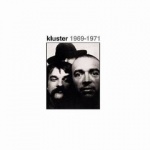|
|
 |
Dusted Reviews
Artist: Kluster Album: 1970-1971 Label: Water Review date: Oct. 16, 2008 |

|
|
|
 |
Nowadays the term krautrock denotes music with a steady, not-so-funky beat supporting a lot of spacey sounds like Can’s “Mother Sky,” Neu’s “Hall Gallo,” or the Cluster album Sowiesoso. But the early German sound adventurers whose work gave birth to krautrock were rarely so focused on linearity, or even music for that matter, and so it was with the pre-Cluster ensemble Kluster. In fact, despite sharing most of a name and two personnel with Cluster, they are distinctly different animals. Although Conrad Schnitzler, who was an early member of Tangerine Dream as well as Kluster’s founder, combined electronic and acoustic sounds somewhat like Karlheinz Stockhausen and his Darmstadt acolytes did, and embraced improvisational methods around the same time as Peter Brötzmann, different motivations drove his music. His affiliation with artist and teacher Joseph Beuys is more telling; Schnitzler, like Beuys, made art that rejected historically received themes and academically prescribed techniques, and instead drew from material and methods from the world around him. The clank and grime of industry held particular sway over Schnitzler, who had supported his family by working as a machine repairman in factories.
Initially Kluster was just one in a series of short-lived, noise-themed outfits that Schnitzler used to stage happenings, and he didn’t stay with them very long. What set Kluster apart from its predecessors is that the trio of Schnitzler, Dieter Moebius and Hans-Joachim Rodelius actually made some records, albeit in very small numbers and under bizarre circumstances. Klofpzeichen, Zwei-Osterei, and Eruption were recorded in 1970-71 and each pressed in runs of 300; they have been only sporadically available during the CD age. They got made because Schnitzler fell in with a church organist named Oskar Blarr who wanted to modernize liturgical music. He recruited Kluster to record for the Schwann-Verlag and had them accompany some spiritually themed, socially critical poetry on side one of the first two records; the group got a free hand on side two. Kluster recorded their material first, spending just one day in the studio with engineer Conny Plank, and the texts were added a month later.
One can only imagine the dismay that the opening minute of Klofpzeichen would have generated if played in any church. A drum beats out an irregular cadence and an organ repeatedly sounds a single, heavily-echoed note while Christa Runge’s voice streams dissynchronously from both speakers, her words excoriating German public compliance with a diseased social order that had fostered Nazism and still tolerated racism and militarism. Call it nostalgia, call it now, but if you don’t speak German you’ll probably just call it spooky-sounding. Plank’s recording, which bathes each instrument in a particular degree of reverb while maintaining clarity and separation from the other instruments, obscures the music’s improvised origins. Electronic twitches and distorted cymbals intrude when the voices pause, like roadwork that only becomes audible when the conversation stops. The text-free second side is harsher, with relatively clean peals of feedback cleaving densely echoed percussion like a putty knife. Its evocation of crumbling factory ambience and refusal of convention must have sounded bracingly alienated; now it sounds at once prescient in its prediction of Throbbing Gristle’s viscosity and stasis and sort of nostalgic if you think about what happened to that old Industrial scene.
But it’s precisely people who care about such things, more than Cluster fans trying to get to the source, who are likely to play these CDs more than once. Zwei-Osterei swaps a male voice, equally declamatory in delivery, paired with remorselessly sawed cello. The flip side is harsher than its predecessor, with its combination of primitive percussive bashing and canyon-broad peals of feedback, but less strange to ears conditioned by a couple decades of Sonic Youth and free noise. Compared to contemporary noise-making, it’s sparser and better for it. Eruption came a bit later. Taken from the group’s 12th and final concert and released as a privately pressed LP, it sounds quite a bit like the side twos of its predecessors. The absence of voices make it a more consistent musical experience, but that similarity probably shows why Kluster had to split. Schnitzler wasn’t a guy to do any one thing for long, while Moebius and Roedelius’s subsequent work has eagerly embraced durational process.
By Bill Meyer
|







